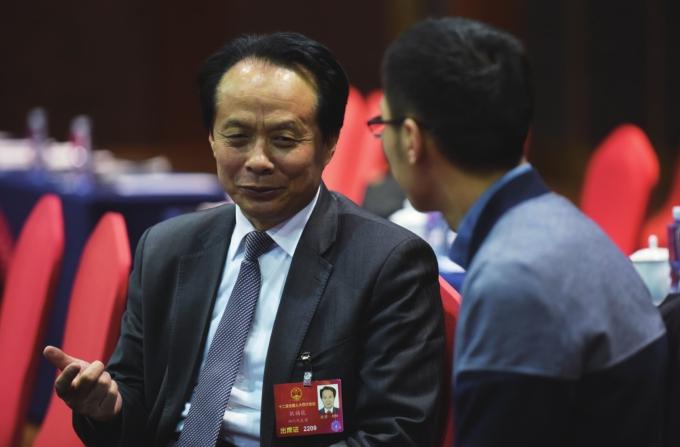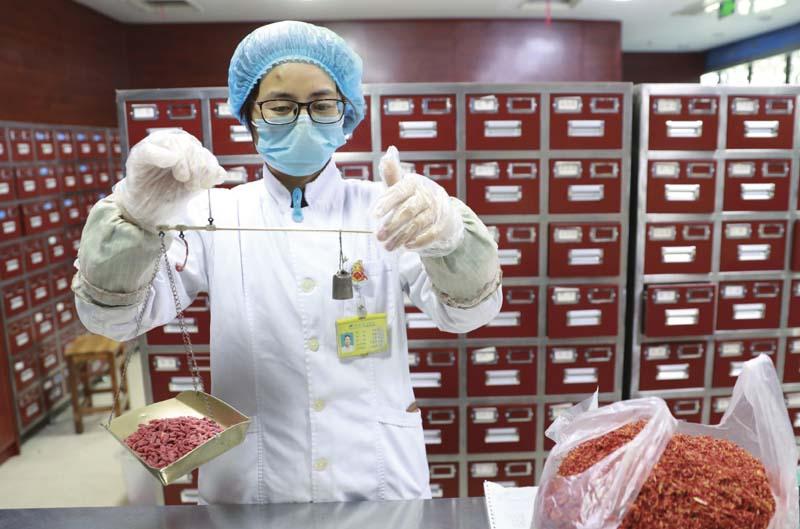Future of Herbs
2019-04-04ByYuanYuan
By Yuan Yuan
This was the seventh year Hu Jiqiang, President of Zhejiang Conba Pharmaceutical Co. Ltd., attended the annual session of the National Peoples Congress (NPC) in Beijing. As a deputy for two terms of the NPC, Chinas top legislature, he has submitted suggestions related to the development of traditional Chinese medicine (TCM) each year.
At the Second Session of the 13th NPC held on March 5-15, every time Hu talked to the media or on panel discussions, he mentioned a TV series on China Central Television titled TCM Masters, and would elaborate on a scene that was adapted from a true story.
On February 25, 1929—Hu would recount every time—the Ministry of Health of the Republic of China (1912-49) proposed the abolition of traditional medicine, which was opposed by TCM doctors nationwide. After a month, the ministry issued an official notice revoking the abolition.
“The abolition initiative was put forward when China was weak and didnt have enough confidence in our traditions,” Hu said. “Now we have developed into the worlds second largest economy. Our TCM should also have developed, but the current TCM situation is not ideal.”
Independent evaluation
Statistics from the Ministry of Industry and Information Technology show that in the past three years, the ratio occupied by TCM in the medical industry dropped from over 22 percent to 18 percent. “This is not consistent with the nations plan of making TCM development a national strategy,” Hu noted.
In 2016, the State Council, Chinas cabinet, issued the Outline of the Healthy China 2030 Plan and the Outline of the Strategic Plan on the Development of Traditional Chinese Medicine (2016-30), setting the bar for the TCM ratio at 30 percent.
“Now we are getting further from that goal,” Hu lamented. “There have been many reasons leading to this situation. The current medical system in China is dominated by Western medicine and treatments, leaving limited space for TCM.”
Hu said that in the past three years, only one patented TCM drug has been approved by the National Medical Products Administration each year. For a giant country with more than 1,500 TCM pharmaceutical factories, this number is quite small. In comparison, in the last year alone, there were 49 new drugs approved for Western medicine.
“TCM and Western medicine follow different rules in treating diseases, but now we have adopted the evaluation system of Western medicine to TCM, which has hindered the development of TCM.”
Zhao Chao, an NPC deputy and President of Shandong Buchang Pharmaceuticals Co. Ltd., echoed Hus remarks and suggested the government set up an independent evaluation system specifi cally for TCM.
“The debate on whether Western medicine or TCM is more effective has never ceased,” Zhao said. “Some extreme opinions about TCM have had some negative effects on its development. For example, if a patient takes a patented TCM drug and gets side effects on the liver, people will blame it all TCM herbal remedies.”
On the other hand, Zhao is delighted to see that the government has placed more importance on the development of TCM in recent years. The Law on Traditional Chinese Medicine, enacted on January 1, 2017, provided a sounder policy environment and legal basis for TCM development.
For Zhao, these decisions and plans have mapped out a grand blueprint that focuses on the full revitalization of TCM, even though there is still a lot to be done.“Although the government pledged to give equal attention and status to TCM and Western medicine, TCM has long been regarded as an assistant treatment for patients, especially for those with major diseases,” Zhao said. “There is still a large role for TCM to play in medical treatment.”
The herbal economy
When discussing the issue of TCM profits, Li Biao, an NPC deputy and President of the Yunnan Haopy Pharmaceutical Group, used Yunnan Baiyao as an example to explain how traditional medicine enriched the now giant pharmaceutical group.
Used for pain relief and healing wounds, Yunnan Baiyao was created by a doctor from the Yi ethnic group in 1902. Today, it is a household drug in China. In 2018 alone, it sold over 260 kg, with sales volume surpassing 3 billion yuan ($449 million). Lis company has also branched out to other businesses, including toothpaste, band-aids and even facial masks.“We have many herbal medicines in China that deserve more attention and effort to further research and development,” Li said.
As for the herbs themselves, Fang Tonghua, an NPC deputy and President of the Heilongjiang Zhenbaodao Pharmaceutical Group, cited some of the problems in the drug market. “Herbs need to be grown in specifi c places to be genuine and effective,” Fang said. “For example, only ginseng grown in Chinas northeastern Heilongjiang and Jilin provinces can have its due effects, while those grown in the south are not much different from turnips. But many herb processing factories would rather ignore this fact, which results in some chaos in the herbal market.”

Geng Funeng, an NPC deputy and President of the Sichuan Good Doctor Pharmaceutical Group, saw an opportunity years ago. Since 2014, Geng and his company have conducted a poverty alleviation project in Huodeng Village of Butuo County in Sichuan Province. The unique altitude and soil in the village are perfect for planting an herb called Fuzi, or monkshood.
There is not much technique involved in planting the herb, since it is quite similar to planting potatoes, so Gengs company provided the seed and some simple training.
Initially, some villagers wouldnt accept the herb, as they had been used to growing food crops, but the great financial rewards changed their minds. By planting potatoes, they only earned 500 yuan ($74.8) per mu (0.07 hectares) annually, but by planting Fuzi, they can earn more than 5,000 yuan ($748) per mu.
The business expanded to other villages in the county and by the end of 2018, there were 28 in Butuo that had joined the project, with more than 4,000 households lifted out of poverty.
“Now we are planning to set up a processing plant for Fuzi in the county and it is expected to be the largest Fuzi processing center in China,” Geng told the media.
